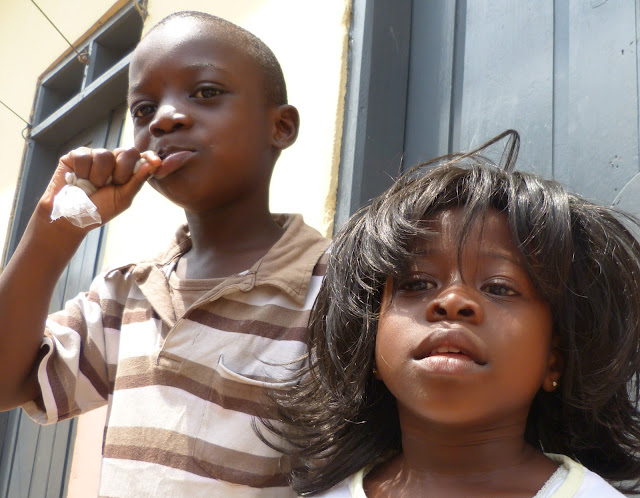 |
| Paa Kwame with his dad Jonas, at his farm in Aburi. Jonas raises pigs.... |
 |
| ...and chickens (that's Jonas' other son, Kofi)... |
 |
| ...and rabbits... |
 |
| ...and, the most recent addition to his menagerie... |
|
 |
| ...a young Brahmin bull (greeting Jonas' daughter Nana and Kofi)... |
 |
| ...and his bride. |
AMONG THE OFORI brothers, Jonas is the farmer's farmer. As the third-born son, Jonas takes after the agrarian side of his father Godfried, who won national farming awards as a leader among Ghana's corps of small farmers who rebuilt the country's agricultural sector after the lean years of the 1980s and '90s.
Godfried still keeps chickens, along with a couple of goats and a small flock of sheep, which wander freely around the family compound and keep the grass in the school yard next door neatly trimmed.
 |
| Godfried's sheep, hanging around the house. |
Jonas chose pigs. A few years ago, he built a house just up the hill from his parents' where he lives with his wife and 3 young children -- Nana, Kofi and Paa Kwame--and started the first piggery in Aburi. The front gate of his small compound opens to a lively bestiary of creatures great and small--in addition to his pigs, there are also chickens, and rabbits, and two young cows he recently added to the mix, purchased from a cattle herder in a neighboring village.
Jonas is a builder. He spent several years constructing his house, a spacious bungalow fronted by a wide concrete patio that contains an underground water cistern. The cistern collects rain water from gutters along the roof and then pumps it through a purifier up into a large water tank on the side of the house. Not so long ago, people collected their water in buckets at the town well, and endured frequent water shortages. The drilling of bore holes and water collection systems like Jonas' in many homes have been a big improvement in people's lives here.
 |
| Jonas at his flour mill, in Aburi town. |
 |
| A laborer running the grinder. |
Farming isn't Jonas' only livelihood. After tending to his animals, Jonas puts in long hours running the family's flour mill in town. He employs a laborer to help operate the milling machine, which grinds whole corn into flour that is a staple in Ghanaian cuisine. Everyone in the area comes to his mill to turn their sacks of corn into flour to make kenkey and banku -- market women, food sellers, local schools, households. It's a lucrative business, but hazardous work; they cover their faces with rags to avoid breathing in the corn dust that floats in the air and use sign language to communicate over the machinery's ear-splitting roar.
Jonas has plans to move his farm to several acres he's purchased near Aburi. He wants to build a cattle ranch, and expand his piggery to help meet the food demands of a burgeoning nation.
Because of farmers like the Oforis, Ghana need never go hungry again.
Ben's Pigs
Ben, Jonas' older brother, recently started his own piggery. He is leasing pens on a nearby farm where he is raising about a dozen piglets. The pigs are still small and lean. Their ears are rimmed with feathery hairs that make you think maybe they can fly. They gaze up at their visitors with heart-breakingly human eyes. Their sweet, inquisitive expressions moved me to tears.
If only they didn't taste so good.




























































